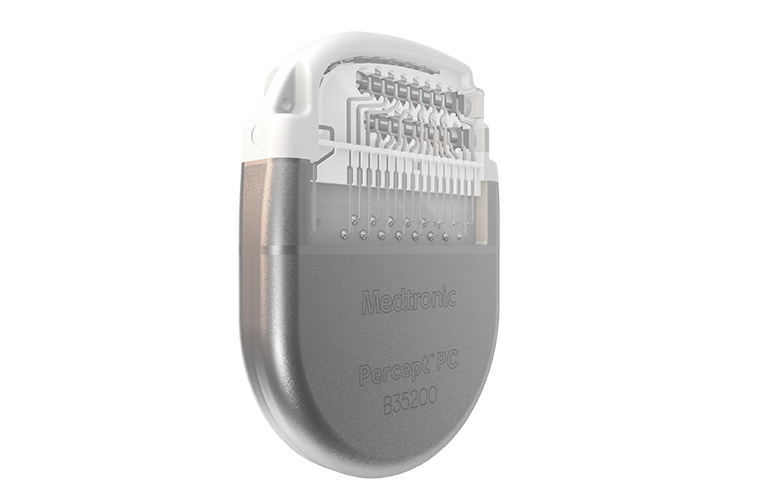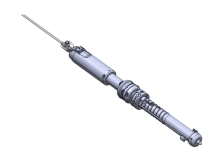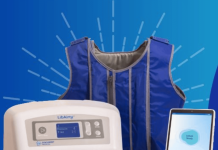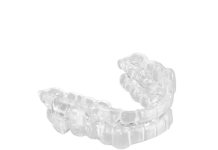Medtronic plc obtained the CE mark for its Sensight directional lead system for deep brain stimulation (DBS) for movement disorders and epilepsy, which is designed to be used with the company’s Percept PC DBS device. Percept received U.S. FDA clearance in June 2020 and CE mark in January 2020.
In DBS therapy, a small implanted, pacemaker-like device sends electrical signals via leads to a targeted area in the brain responsible for symptoms. The Percept system has FDA premarket approval for Parkinson’s disease, essential tremor, and epilepsy and has humanitarian device exemptions for use in patients with dystonia and obsessive-compulsive disorder.
The addition of directional leads brings the Dublin-based company’s DBS package in line with Abbott Laboratories’ Infinity DBS system and Boston Scientific’s Vercise directional systems. Directional leads permit stimulation of very specific areas of the brain while avoiding the side effects of off-target stimulation.
Medtronic’s system one ups the competition with its ability to detect local field potentials (LFPs) which correlate with symptoms and treatment of Parkinson’s disease in some groups of patients. “When you detect LFPs, it provides objective information about the patient’s symptoms,” said James Eubanks, global director of DBS clinical research at Medtronic. “This allows for physiologically informed management of patients.”
By detecting LFPs, the system can further refine the directional stimulation. Detection of these pulses requires the ability to sharply minimize signal interference; LFPs are just one-millionth the strength of DBS stimulation pulses.
The Percept device integrates Medtronic’s Brainsense technology, which allows it to capture LFP signals using the implanted DBS lead. The system can record these signals while a patient receives therapeutic stimulation, whether in the clinic or at home.
“You can correlate these brain signals with stimulation and events capturing medication, symptoms, or side effects – to deliver personalized, data-driven treatment and adjust as patient needs evolve,” Eubanks told BioWorld. He noted, however, that the clinical benefit of brain sensing has not been established, though the safety and performance of the system has been “adequately supported by preclinical studies.”
“This is the only directional lead with built-in sensing capabilities,” said Jens Volkmann, chairman and professor of neurology in the University Clinic of Würzburg. “The challenge of DBS is to provide stimulation to a very small brain region only at times, when fluctuating symptoms require treatment. This new technology holds promise for a truly personalized therapy, which we can adapt using the objective data from each patient to inform programming in ‘space and time.'”

Enhanced programming
The integrated Sensight leads and Percept system enables processing and analysis of brain signals in real time. The device records the signals for later viewing and can be exported for offline data processing. Physicians can preprogram up to four events, including medication adherence, side effects, and on or off state and patients can capture those events using a patient programmer so that the correlation can be analyzed at their next visit.
The first Sensight directional leads were implanted at the University Clinic of Würzburg and Grenoble Alpes University Hospital on March 17 and 18, 2021. A full launch in Western Europe is now underway.
Eubanks said that Medtronic anticipates FDA clearance for Sensight in the summer of 2021.
To date, Medtronic has implanted more than 175,000 DBS systems and plans more improvements in the near term. Percept has performed quite well in the $620 million market. ”In brain modulation, our Percept PC launch has led to nearly a point of share gain year-over-year, and several points of share gain sequentially from Boston Scientific and Abbott. Now, given our technology differentiation, we expect DBS share gains to be a multi-year trend,” said Medtronic Chairman and CEO Geoffrey Martha on the company’s third-quarter earnings call on Feb. 23, 2021.
The company’s Adapt-PD pivotal trial, currently underway, “is studying our closed loop, adaptive technology that will further extend our leadership position in DBS,” Martha added.




